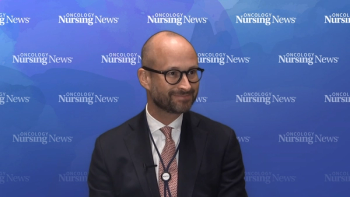
The FDA has accepted the resubmission of a BLA for odronextamab for the treatment of patients with relapsed/refractory follicular lymphoma.

The FDA has accepted the resubmission of a BLA for odronextamab for the treatment of patients with relapsed/refractory follicular lymphoma.


T-DXd delivered an OS benefit for patients with unresectable or metastatic HER2-positive gastric and GEJ adenocarcinoma following trastuzumab-based treatment.

Oncology nurses and APPs play a key role in educating patients on BREAKWATER study findings and their impact on BRAF-mutant CRC treatment.

Camizestrant with a CDK4/6 inhibitor was well tolerated and effective as first-line therapy for patients with ESR1-mutated, HR-positive/HER2-negative advanced breast cancer.

Patients who receive certain cancer treatments are at greater risk of secondary malignancies and must be educated accordingly.

The FDA approved tislelizumab-jsgr (Tevimbra) with platinum chemotherapy as a first-line treatment for adults with PD-L1-positive, unresectable or metastatic esophageal squamous cell carcinoma.

Hazards of the LA wildfires necessitate awareness that first responders and those central to the fires may be at risk for developing cancer.

Preliminary findings suggest that OH2 monotherapy is safe, with promising responses observed when combined with HX008 in locally advanced or metastatic sarcoma.


The FDA is conducting a priority review of nivolumab plus ipilimumab for the first-line treatment of patients with unresectable or metastatic MSI-H/dMMR colorectal cancer.

For patients with relapsed BRCA-mutated ovarian carcinoma, rucaparib produced a median OS of 19.4 months vs 25.4 months with chemotherapy in new findings.

The FDA granted petosemtamab plus pembrolizumab breakthrough therapy status for PD-L1–positive recurrent/metastatic head and neck squamous cell carcinoma.

Median time to sustained worsening of symptoms was 23.7 months with cilta-cel, compared with 18.9 months with SOC.

The FDA granted SIGX1094 fast track status as a treatment option for diffuse gastric cancer.

Similar to financial toxicity, time toxicity can have a profound impact on a patient’s quality of life.

AUTX-703, a novel, oral KAT2A/B degrader, has received fast track designation for use in relapsed/refractory AML.

Updates to the NCCN guidelines recommend HEPZATO KIT for use in hepatic-dominant uveal melanoma as a Category 2A treatment option.

The FDA has given RZ-001 fast track designation for HCC after demonstrating therapeutic activity in preclinical studies.

Perioperative chemotherapy improved survival compared with preoperative chemoradiotherapy in managing esophageal cancer.

Axel Stuart Merseburger, MD, PhD, explained that with TKIs like axitinib, it is necessary for oncology nurses to spend time with each patient to provide the best care.

Avelumab in combination with axitinib was found effective and safe as frontline treatment for advanced RCC in real-world findings.

The NCCN updated its guidelines to clarify the role of ctDNA as a biomarker for recurrence risk in colon and rectal cancer and for disease monitoring in Merkel cell carcinoma.

Patient-reported outcomes were consistent between patients with RCC using tivozanib/nivolumab and tivozanib monotherapy according to study findings.

Erica S. Doubleday, MS, FNP-C, BSN, RN, discussed taking advantage of available resources to provide comprehensive care for patients with breast cancer.

Katy Beckermann, MD, PhD, explained that oncology nurses and APPs should be ready to administer and explain dose modifications for patients with RCC.

T-DM1 reduced risk of invasive disease events and death compared with trastuzumab in HER2-positive early breast cancer with residual invasive disease after neoadjuvant therapy.

According to Laurence Albiges, MD, PhD, treatment of RCC with cabozantinib, nivolumab, and ipilimumab can cause potentially serious toxicities that should be closely monitored.

Immune checkpoint inhibitors for patients with cancer may be associated with an increased risk for psoriasis when compared with chemotherapy, monoclonal antibodies, and protease inhibitors.

The role of oncology nurses and APPs in research is largely to stay abreast of trials that may be useful to patients and recommend them whenever possible, according to Erica Doubleday, MS, FNP-C, BSN, RN.